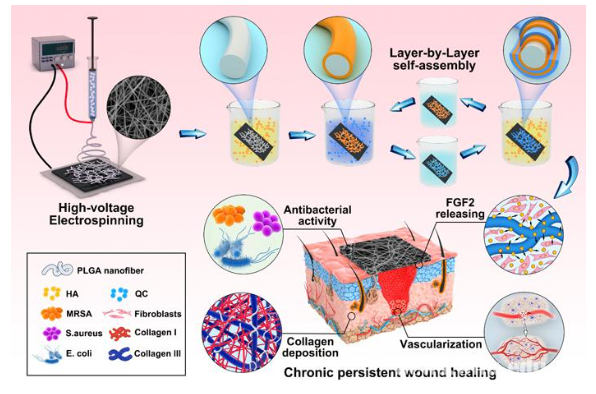Recently, Chemical Engineering Journal published an article online with the latest research findings by Prof. Wang Xinghuan’s team (Zhongnan Hospital of Wuhan University) as the highlight of its cover.
The paper is entitled Antibacterial and Angiogenic Wound Dressings for Chronic Persistent Skin Injury. The co-first authors are PhD students Wang Zijian and You Wenjie (both from Zhongnan Hospital of Wuhan University) and Dr. Hu Weikang (Advanced Biomaterials and Tissue Engineering Center, Huazhong University of Science and Technology). The co-corresponding authors are Prof. Wang Xinghuan and Prof. Chen Yun (School of Basic Medicines, WHU). Prof. Chin-Lee Wu from Harvard University and Prof. Céline Huselstein from the University of Lorraine also participated in this research. The research was funded by Wuhan University’s Medical Take-off Plan and the National Natural Science Foundation of China (NSFC).
Chronic persistent skin injury is a late complication in diabetics. Due to the long-term high blood glucose level, the amino group of protein and the aldehyde group of glucose are apt to form advanced glycation end products (AGEs) in the patient’s blood vessel wall, which seriously damage the structure and biological function of blood vessels. On the other hand, as the hospitalization period is prolonged, the probability of patients acquiring nosocomial drug-resistant infection increases substantially. There is a prevailing recognition that poor blood supply and drug-resistant bacterial infections are the key factors leading to the unfavorable prognosis of persistent skin injury. Based on the previous work, this study clarifies the core needs of wound dressings and fabricates a kind of nanofiber dressing with excellent antibacterial property and angiogenic activity. As shown in the figure below, PLGA nanofibers were prepared using high-voltage electrospinning technology. Afterwards, the functional modification of these dressings was conducted via layer-by-layer (LBL) self-assembly technology. The raw materials used in this study, like PLGA and hyaluronic acid, are characterized by excellent biosecurity. In addition, no toxic chemical crosslinkers are used in the preparation process, which satisfies the needs of clinical transformation to the maximum. The results reveal that the nanofiber dressings could accelerate skin tissue regeneration mainly through reducing inflammation, enhancing collagen deposition, and promoting cell proliferation and vascularization.

Prof. Wang Xinghuan’s research group reviewed the cross-linking strategies of biopolymer hydrogels and developed an intensive cellulose hydrogel material with no hematophagia but fine hemostasis efficacy. To resolve the problem of the prevention and treatment of clinical drug-resistant bacteria, the team has successively developed triazine silk fibroin (SF) antibacterial fibers and quaternized chitin (QC) self-assembled antibacterial dressings. The related achievements have been frequently cited and reported by Chemical Review.
In recent years, Prof. Wang Xinghuan’s team has established cooperative relationships with the Wuhan University College of Chemistry and Molecular Sciences and the School of Basic Medical Sciences, the School of Life Science and Technology of Huazhong University of Science and Technology (HUST), and the National Institutes of Health (NIH). Prof. Wang Xinghuan’s team actively conducts translational medicine research, realizing the integration of basic research and clinical applications, relying on the Hubei Engineering Research Center for precise diagnosis and treatment of tumor and translational medicine as well as the Clinical Trials Center of Zhongnan Hospital of Wuhan University.
Paper link: https://www.sciencedirect.com/science/article/pii/S138589472032653X
Written by: Wang Guanyi
Rewritten by: Lin Wanping
Edited by: Zhu Tong, Sylvia and Hu Sijia